Remembering Madeleine Albright, 1937-2022
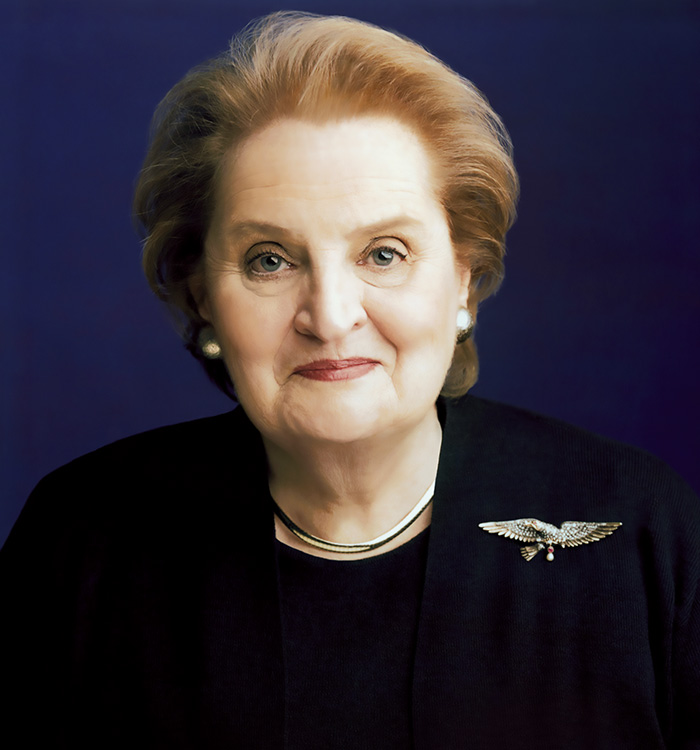
The Foreign Service Journal and the American Foreign Service Association mourn the passing of former Secretary of State Madeleine K. Albright, who died on March 28 at the age of 84.
Secretary Albright broke a very persistent glass ceiling when she became our nation’s first female Secretary of State in 1997. It was neither the first nor last “first” in her remarkable life. A native of Czechoslovakia who arrived in the United States as an immigrant in 1948, she never forgot what her adopted home country stood for and fought for those principles during her diplomatic career, which included service as the U.S. Permanent Representative to the United Nations from 1993 to 1997.
During her four-year tenure as Secretary of State (1997-2001), Albright was a strong advocate for democracy and human rights. She worked to ensure the nonproliferation of nuclear weapons from the former Soviet republics to rogue nations and promoted the expansion of NATO eastward, dealt with the terrorist attacks on U.S. embassies in Kenya and Tanzania in 1998, successfully pressed for military intervention under NATO during the humanitarian crisis in Kosovo in 1999, furthered the normalization of relations with Vietnam, and supported the expansion of free-market democratization and the creation of civil societies in the developing world, among other things.
Following her time at the State Department, Secretary Albright returned to her role as a professor in the practice of diplomacy at Georgetown University’s School of Foreign Service and served as chair of the Albright Stonebridge Group, where many Foreign Service alumni have worked over the years. She received a Presidential Medal of Freedom in 2012. She remained engaged in U.S. foreign policy—writing, speaking, advising, advocating—right up until her death.
AFSA sends its sincere condolences to Secretary Albright’s family, untold colleagues and friends around the world, and to the many students whose lives she touched. The Foreign Service community will fondly remember her.
Inspiring women …
BY LYCIA COBLE SIBILLA
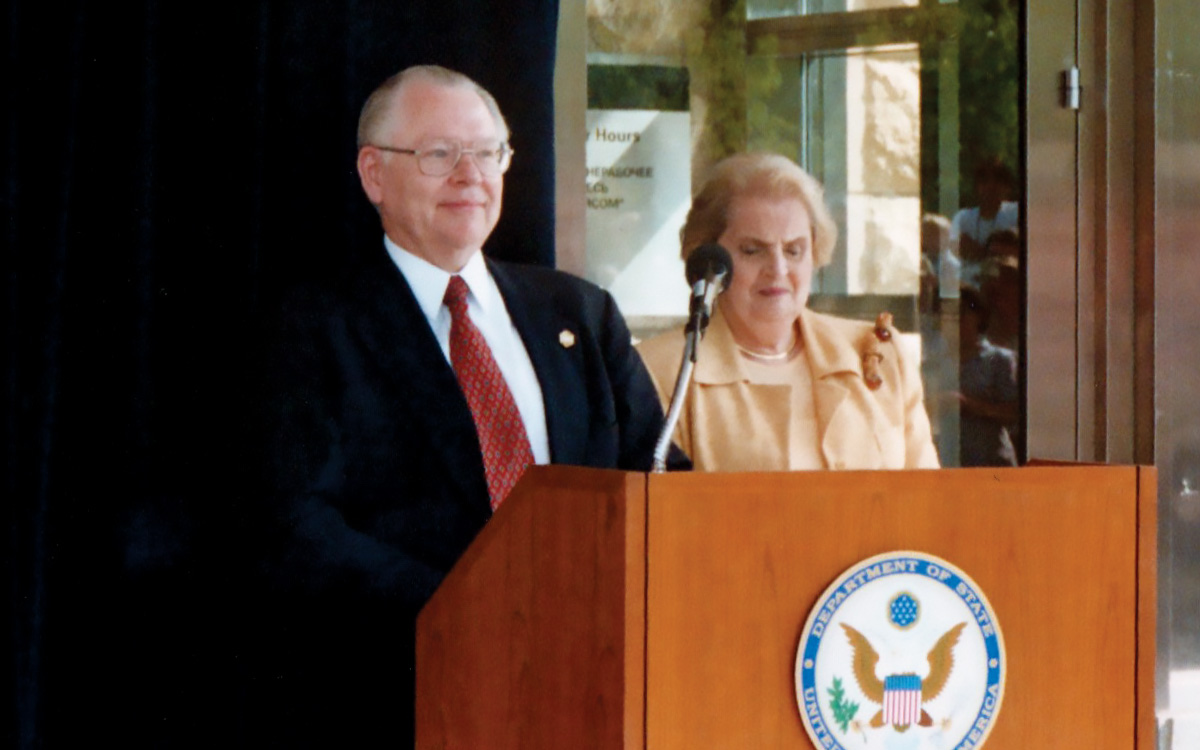
Ambassador James Collins introducing Secretary Albright at the dedication of a new embassy building in Moscow in 2000.
Courtesy of Lycia Sibilla
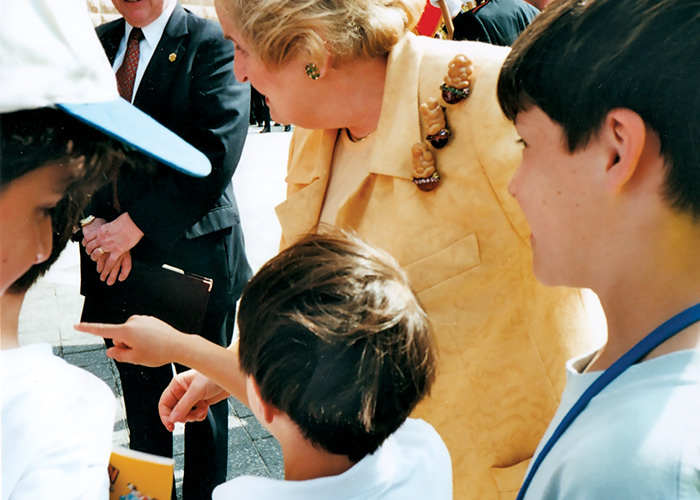
The Secretary looks as Max Sibilla, the author’s son, enthusiastically points out an important feature of the embassy to her.
Courtesy of Lycia Sibilla
From 1995 to 1997, I had the pleasure and honor to work with Secretary Albright, then U.S. ambassador to the United Nations, and her staff before, during and after the U.N. Fourth World Conference on Women held in Beijing. I was a member of the Conference Secretariat and then of the President’s Interagency Council on Women.
There were Preparatory Committee meetings at the U.S. Mission to the U.N. and lots of briefings with nongovernmental organizations planning to attend the conference. In Beijing, the most memorable moments were the first lady’s speech and visits to the NGO conference in Huairou—bad weather and mud notwithstanding. That night, the delegation celebrated at the U.S. ambassador’s residence. Spirits were high, and as a memento and a thank you for our efforts, Ambassador Albright gave each delegation member a signed Chinese poem she liked to quote:
We keep a dog to watch the house. A pig is useful, too.
We keep a cat to catch a mouse. But what can we do
With a girl like you?
As part of the U.S. follow-up to the conference, the President’s Interagency Council on Women was established at the White House. I was delighted to be asked to help stand up the office and then moved with it to the State Department.
In 2000 Secretary Albright came to Moscow, where my husband was serving. After her meetings with Vladimir Putin, where she wore her famous “Three Monkeys” pins, she and Ambassador James Collins dedicated the new embassy building and met with staff and families.
A few years later I attended her book signing for Read My Pins at the Smithsonian and brought the photos from the embassy dedication along for her. She thought they were some of the best unofficial photos of her wearing the “Three Monkeys.”
She was an inspiration and is greatly missed.
What she taught me …
BY B. BIX ALIU

Secretary Albright and Bix Aliu meet with refugee families at the Stenkovec Refugee Camp near Skopje, Macedonia, on June 11, 1999.
Courtesy of B. Bix Aliu
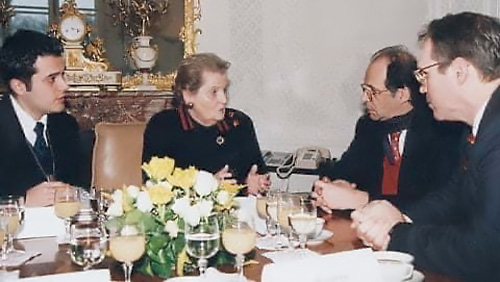
Secretary Albright and President of Kosovo Ibrahim Rugova meet during the Rambouillet Peace Accords, March 1999. From left: B. Bix Aliu, Secretary Albright, President Ibrahim Rugova and Ambassador Christopher R. Hill.
Courtesy of B. Bix Aliu
Some say never meet your heroes. Some say they may let you down. Well, I got to meet mine, and she surpassed every expectation I had. She took me under her wing and followed my career until the day she passed away.
Diplomacy is an apprenticeship. You learn by watching, following and at times mimicking those who you’ve witnessed doing it. Sure, you can read as many books as you want and have many degrees that fill your wall. The art of diplomacy, however, needs to be observed, practiced and mentored.
Secretary Albright taught me perseverance, confidence and how to be a fierce advocate for democracy. She said: “Human relations ultimately make a huge difference.” The Secretary of State would always apologize when Ops would connect us in the middle of the night because she needed me to translate. She would smile and wink at me if I had to make what she said sound humorous in Albanian. She would listen to my suggestions for talking points during her negotiations to create a free Kosovo.
She always said: “I loved being Secretary of State; that’s probably evident to everyone who watched me.” It was always evident to me, and I was someone fortunate enough to be able to watch her.
She worked harder than anyone …
BY SHAWN DORMAN
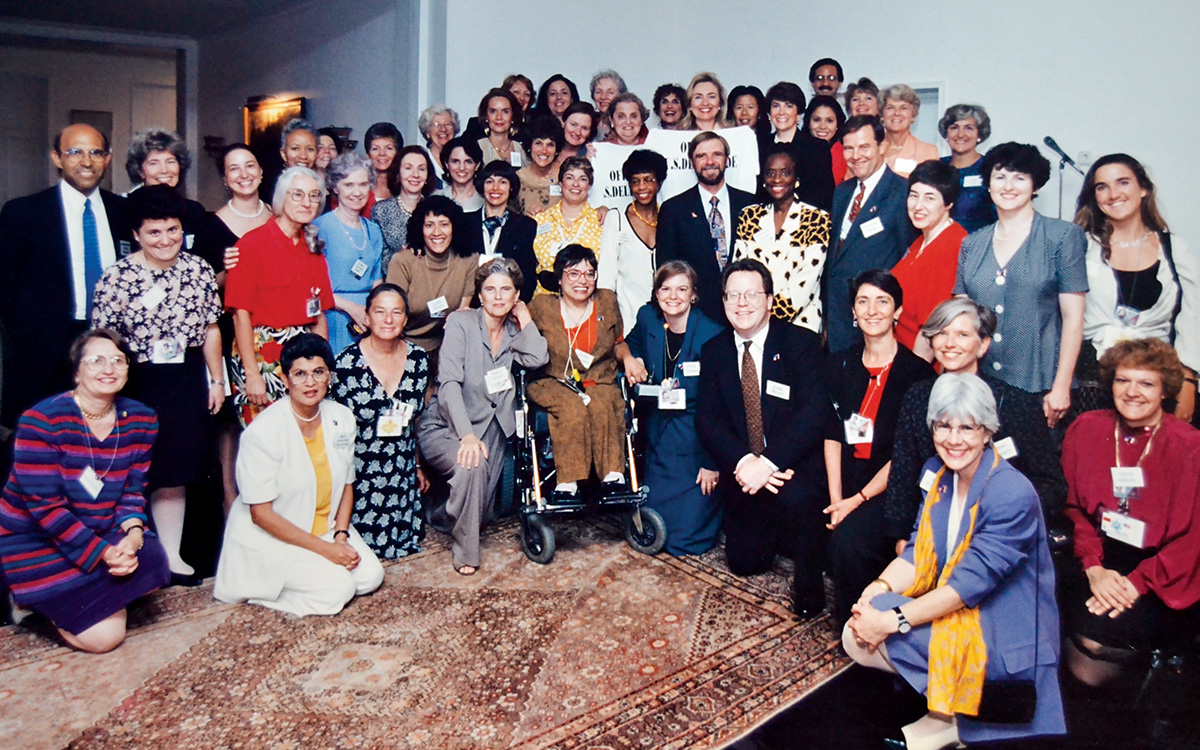
The U.S. delegation to the Fourth World Conference of Women in Beijing in 1995. U.S. Ambassador to the United Nations Madeleine Albright and First Lady Hillary Clinton are in the third row, center, holding white T-shirts.
U.S. White House
A tremendous loss of an inspiring leader. Madeleine Albright was Secretary of State when I was serving in the State Department Operations Center. She was tough and demanding and so very good. We would set up her calls and take notes when she spoke to foreign leaders, which was a lot, every single day. During the Kosovo crisis, every day at 5 p.m., five foreign ministers on one call. She was the only woman on the call; but she was the powerhouse presence, the woman in charge.
She would sometimes call Ops without notice to ask, “What do I need to know?” And the watch officer who picked up that call better be ready to tell her what was going on in the world that might require her attention. On Christmas Eve I was the watch officer, and she called. She sounded softer, friendly. I recall she said she was making a gingerbread house with her daughters.
What did she need to know? Right now, at this moment, nothing. There was no emergency in the world (that we knew of) that required her immediate attention. It was a special moment for me to get to say that to her. She worked harder than anyone, and she got to take an evening off to be with family.
Leading the way …
BY JULIE RUTERBORIES
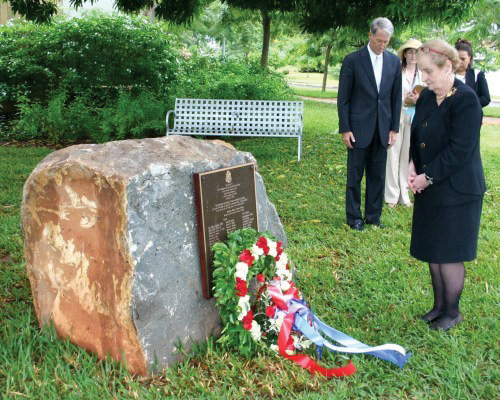
Former U.S. Secretary of State Madeleine K. Albright on a private visit to the U.S. Mission in Dar es Salaam on Nov. 29, 2006, to honor the lives lost on Aug. 7, 1998, when terrorists attacked the mission. U.S. Ambassador Michael L. Retzer joined her at the wreath laying ceremony.
Embassy Tanzania
I was blessed to first meet Madeleine Albright more than 35 years ago. In 1987 I was one of the fortunate students in Georgetown’s School of Foreign Service selected for her Senior Seminar. It was an extraordinary experience. We crossed paths just two years later, when I was working at the U.S. embassy in Moscow. I remember how excited I was to share with her the amazing experiences I was having living in the Soviet Union, and how grateful I was for all I had learned in her class.
Then, in 1996, I began a tour in the Ops Center. One weekend we received a call to say that Ambassador Albright was on her way in to review a document. I was sitting in the first seat as you came into the old Watch. I was nervous, so in my head I practiced saying, “Hello, Ambassador Albright.” She walked into the room, and before I knew it, I blurted out, “Hi, Professor Albright.” We both laughed.
Many years later, as a diplomat in residence for the Southern Mid-Atlantic region, I recounted stories and experiences about a career in public service with the Department of State. One fun fact I was always sure to mention concerned diversity and representation. When I joined the State Department, every single Secretary of State had been a white male. During my career, I served with two women and two African American Secretaries. Madeleine Albright truly led the way. I am forever grateful for her leadership and example.
A Night with Albright
BY KATE NANAVATTY
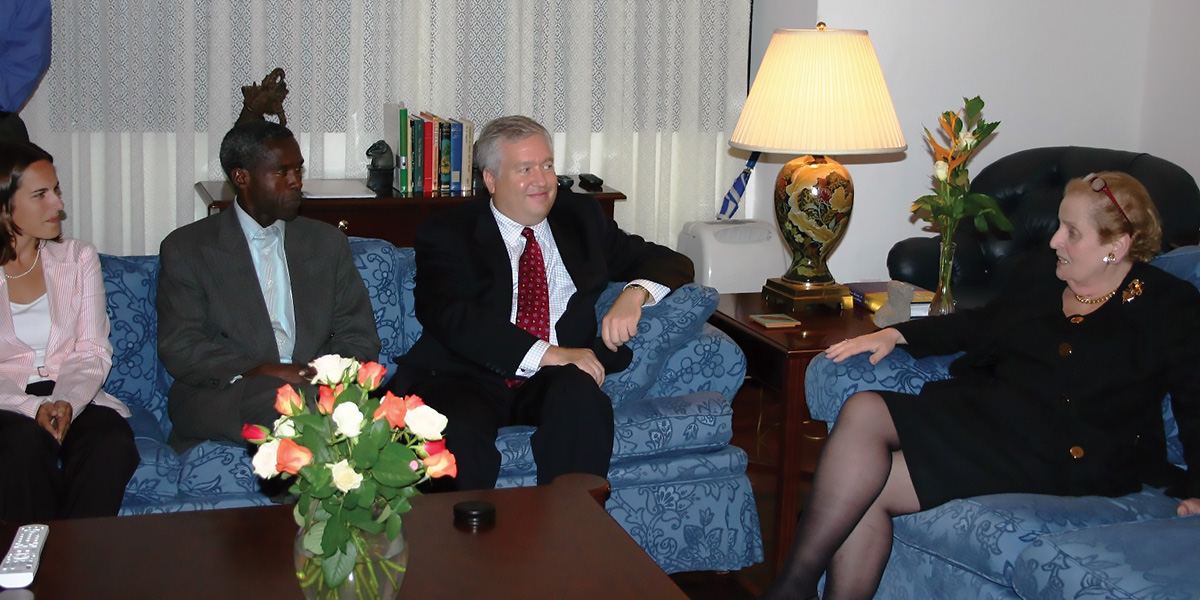
Former Secretary of State Madeleine Albright, far right, at DCM Purnell Delly’s residence in Dar es Salaam on Nov. 29, 2006. From left: Political Officer Kate Bernshon Nanavatty, Management Officer Tuli Mushingi and Financial Management Officer Robert Miller.
Embassy Tanzania
Madeleine Albright’s motorcade was lost roaming the Msasani Peninsula in Dar es Salaam trying to find the right house. It was Nov. 29, 2006, and we stood—10 Foreign Service officers—in the living room of our deputy chief of mission’s house chatting a bit more anxiously than usual. Staff circulated the first round of cocktails; the DCM did one last check of name cards on the carefully set dinner table; and we determined the proper way to address her.
When Madam Secretary did arrive, only because she instructed her driver to overtake the hopelessly lost motorcycle escort, she greeted us warmly and took a seat on the sofa. She wore a black suit dress with one of her trademark brooches—a large, gold flower. She got straight down to business: “Feel free to ask me anything. Now that I am not Secretary of State, I can try to answer you!”
And she did. From Sudan to Iraq, to North Korea, she answered our questions thoroughly, offering us her insight, experience and her own questions about these quandaries. In Sudan, she admitted, there seemed to be no good options. “I am not sure what is protecting Sudan, but it seems there are a few countries—maybe Egypt and China—that prevent Al-Bashir from an international shaming for Darfur. There is a great deal of public concern about Darfur, and yet nothing is happening. The militia blames the government, and the government blames the militia: There are no good guys, unfortunately.”
On Iraq, she underlined her disgust with Saddam Hussein and confessed that even she believed there were weapons of mass destruction in Iraq: “I thought there were WMD based on deduction—we knew weapons had gone missing from the International Atomic Energy Agency inspectors.” But she insisted: “Still, I never believed Iraq to be a direct threat to the United States; and, therefore, the war was one of choice and not necessity.”
On North Korea, Albright shared her experience negotiating and dining with North Korean President Kim Il-sung. She stressed that this man was not crazy and had a surprisingly high level of technical knowledge. She recalled presenting a package, which would include U.S. support to help North Korea build light water reactors for civilian nuclear technology. She offered the president a chance to review the package and perhaps respond after consultations with his advisers. But Kim Il-sung immediately began with a series of questions that demonstrated a sophisticated understanding of the technology.
In Albright’s view, the Agreed Framework deal, which she helped negotiate under the Clinton administration, failed mainly because of negligence on the U.S. side rather than North Korean defiance. “The U.S. had made the agreement but forgot that it would cost money. Coming up with the money from Congress was problematic, and we were late on delivering our end of the bargain.” Was North Korea cheating? “Of course they were. But that is generally the case with arms control treaties,” she explained. “They don’t eliminate arms, but they help make it harder to get arms.”
I was nervous, so in my head I practiced saying, “Hello, Ambassador Albright.”
Over dinner she revealed her most entertaining stories. She told us how as ambassador to the United Nations, she got her nickname. In 1996, the Cubans downed two U.S. aircraft and were caught on radio quipping that American pilots had no “cojones.” This prompted Madeleine to tell Cuba at a U.N. Security Council meeting, that Cuba’s action had no “cojones” and was all cowardice. When she attended the memorial service for the downed pilots in Florida, she entered the Orange Bowl to 60,000 fans chanting her new nickname: Madam Cojones! Among Floridians, the name has stuck to this day, and she was approached in cafés on the street as “Madam Cojones.” She also reminisced about doing the “Macarena” on the Security Council floor after promising to do the dance if the Democrats won the 1996 election.
The jaw-dropping story of the night, however, traced back to her father’s death in 1977. Dr. Corbell, Secretary Albright’s father, was a former diplomat in Czechoslovakia. After immigrating to the U.S., he became a highly regarded professor of international relations at the University of Denver. When he died, Albright explained, there was an outpouring of support from the university community. She recalled the countless bouquets of flowers, which were delivered to her house. Among all the flowers, one bouquet caught her eye: it was a piano-shaped vase filled with flowers. Madeleine asked her mother, “Who sent this arrangement?” And her mother replied, “Those flowers are from your father’s favorite student, Condoleezza Rice.”
Madeleine sought out her father’s favorite student and learned that Condoleezza had gone to college to major in music but was persuaded by Albright’s father to also major in international relations. Condoleezza had, after all, decided to write her senior thesis on the Soviet influence within the Czech military. Years later, working on a string of losing Democratic campaigns, Albright decided to form a brain trust of foreign policy advisers for Michael Dukakis and to invite Condoleezza to take part.
She telephoned Condoleezza, who at that time was teaching at Stanford University. Albright’s proposition was followed by moments of silence. “Madeleine,” Condoleezza stammered, “I’m not sure how to tell you this, but … I’m a Republican.” Dumbfounded, Secretary Albright exclaimed: “But Condoleezza, we had the same father!”
We looked at one another around the dinner table in awe. What were the chances that one man was responsible for two female Secretaries of State?!
In addition to storytelling, Secretary Albright had an endearing capacity to self-assess. “I was a bureaucratic nightmare,” she said in a matter-of-fact tone. “Being Secretary of State is the best job in the world. I loved every minute of it. And as a result, I found it very difficult to prioritize.”
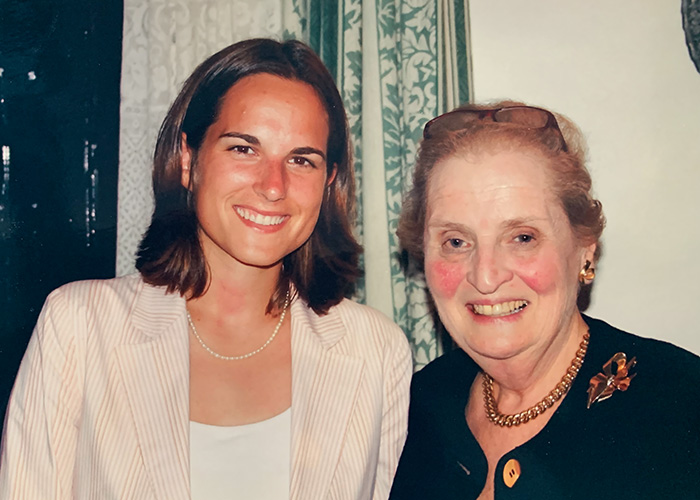
FSO Nanavatty and Ambassador Albright.
Embassy Tanzania
She talked about trying to connect with staff and not always succeeding. “I used to make a point of eating in the cafeteria. But usually this meant I ate alone, since people didn’t feel comfortable talking to me.” And she told us that she would stop by people’s offices and ask for their views or feedback. “That didn’t really work either,” she explained. “People generally got all flustered and weirded out.”
She emphasized that she was not the best at taking care of the troops, i.e., State Department bureaucrats. Instead, she traveled the world, seeing her job less as a manager and more as the chief U.S. diplomat abroad. Revealing a bit of the friendly rivalry between her and Secretary Rice, she said, “No matter how much I traveled, I know Condoleezza will travel one more mile than me … even if it kills her.”
Secretary Albright made clear that she missed her job, a job she saw as the ultimate fit with her passion for foreign policy and problem-solving. Despite being 75, she had not retired from working or from bending her mind around the stickiest situations. How should we deal with conflicts in the Middle East? What about the so-called clash of civilizations? One lesson she wanted to pass on was that the U.S. badly needed religious advisers and greater participation from religious leaders in international negotiations.
“As Secretary of State, I had an expert on everything—everything except religion.” Saying she was in no way trying to blur the line between church and state, she stressed that religion was—like it or not—a part of the picture. She advocated training on religion in addition to area study and language training for Foreign Service officers. She contended that negotiations between Palestinian Authority Chairman Yasser Arafat and Israeli Prime Minister Ehud Barak at Camp David in 2000 might have been more effectual had they involved religious leaders, not only to understand the problem but to legitimize the agreement.
Around 10 p.m., her cheeks slightly flushed from a few glasses of wine, Secretary Albright knew it was time to call it a night. She had told stories and answered our questions for more than three hours. As I listened intently for the entire night, these thoughts raced through my head: How am I going to remember all of this? I can’t believe I get to be sitting here. She hasn’t faltered or said “um” or “like” once!
At the time, I couldn’t process in full why it was such a special night—beyond the obvious: I am sitting across the table from the first woman Secretary of State. But with some reflection, I realized what I was appreciating. She was candid about her love of being Secretary. She was honest about not knowing the solution to various problems and open about her weaknesses.
Above all, she was still a fierce optimist about the United States. She conceded that it would be a hell of a job to try to put America back on course, given the foreign policy fiascos at hand. But she also emphasized what America was capable of and that there was room for the Right and Left to work together. “I so believe in the good of America,” Albright said. And I do, too, especially after my night with Secretary Albright.
Read More...
- “The FSO of Tomorrow,” by Madeleine K. Albright, The Foreign Service Journal, May 1997
- “Lessons of the UN,” an interview with Madeleine Albright, The Foreign Service Journal, December 1995
- “Celebrating the Life and Legacy of Secretary Madeleine Albright,” by Roberta Mather, U.S. State Department Bureau of Global Public Affairs, April 29, 2022



